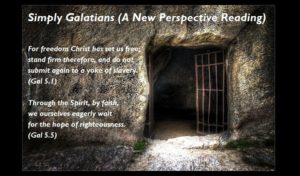 The Early Perspective on Paul has equipped us to better understand Paul’s letter to the Galatians.
The Early Perspective on Paul has equipped us to better understand Paul’s letter to the Galatians.
Welcome to the Simply Galatians series. In this series I give a hybrid New Perspective interpretation combining insights from the Early Church Fathers and the New Perspective on Paul.
- Simply Galatians 1 If anyone is preaching to you a gospel contrary to the one you received, let him be accursed
- Simply Galatians 2 A person is not justified by works of the law but through faith in Jesus Christ
- Simply Galatians 3 Having begun by the Spirit, are you now being perfected by the flesh?
- Simply Galatians 4 When the fullness of time had come, God sent forth his Son
- Simply Galatians 5 For through the Spirit by faith, we ourselves eagerly wait for the hope of righteousness
- Simply Galatians 6 The one who sows to the Spirit will from the Spirit reap eternal life
In doing so I want to make the point that if we go back to the sources (‘ad fontes’) looking at both the scripture (‘Sola Scriptura’) and the earliest interpretations of Galatians, we as the church, can better understand (‘Semper Reformanda’) what Saint Paul really said.
The main argument of Paul’s letter to the Galatians is that Gentile believers must not put themselves under the law of Moses or think they have to observe its works in order to be recognised as righteous. Rather, Paul encourages Gentile believers to trust in Christ and seek the guidance and empowerment of the Holy Spirit in order to reap eternal life.
In this introduction to Galatians I reveal the backstory to Paul’s dealings with the Galatian church and what the problem is that Paul is addressing.
Contents
Paul and the Galatian Backstory
The letter itself is actually quite nested in a number of shared experiences of Paul and the Galatians. The letter itself alludes to several aspects of their shared history. So in order to set the context for my understanding of the letter it’s best to flesh out their backstory.
Before Paul’s First Visit

We may assume that many in the Galatian church were unbelievers at some point. In Paul’s letter to the Galatians he refers to what he knew of them prior to them accepting the gospel.
8 Formerly, when you did not know God, you were enslaved to those that by nature are not gods.
9 But now that you have come to know God, or rather to be known by God, how can you turn back again [πάλιν: palin] to the weak and worthless elementary principles of the world, whose slaves you want to be once more [πάλιν palin]?
10 You observe days and months and seasons and years! 11 I am afraid I may have labored over you in vain. (Gal 4.8-11; cf. 5.1)
‘Did not know God’, ‘Enslaved’. Paul refers to their past lives. He says they did not know God and they were enslaved to those who are not gods. Men, falsely claiming to be something they are not.
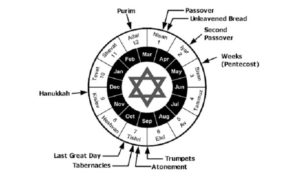
‘Elementary principles’, ‘Days and months and seasons and years’. He refers to these observances as elemental principles of this world. For more on this see the post on Galatians 4.
Because of the number of references to circumcision (Gal 2.7-8, 12; 5.3-6, 11; 6.12-15) and the law of Moses (Gal 2.16, 19, 21; 3.2, 5, 10-13, 17-24; 4.4-5, 21; 5.3, 14; 6.13) in Galatians, I assume the ‘days’, ‘months’, ‘seasons’ and ‘years’ refer most likely the Mosaic calendar observances.
To best understand these observances we need to remind ourselves that after God delivered Israel from slavery in Egypt he gave them the law of Moses to respond in obedience. The law of Moses included the following commands;
About the Festivals and Holidays: “Three times a year all your males shall appear before the LORD your God at the place that he will choose: at the Feast of Unleavened Bread, at the Feast of Weeks, and at the Feast of Booths. They shall not appear before the LORD empty-handed.” (Dt 16.16)
About Worship and Sacrifice: “And this shall be a statute forever for you, that atonement may be made for the people of Israel once in the year because of all their sins.” (Lev 16.34)
About Purity and Washings: “If the man who is unclean does not cleanse himself, that person shall be cut off from the midst of the assembly, since he has defiled the sanctuary of the LORD. Because the water for impurity has not been thrown on him, he is unclean. And it shall be a statute forever for them.” (Num 19.20-21)
‘Again’, ‘Once more’. The word translated as ‘again’ is clear in the Greek [πάλιν palin]. Paul at the time of his writing the letter Paul says they have turned back again to observing these commands.
So before they met Paul, the Galatians had some interest in Judaism and were participating in Mosaic calendar observances. Now they are doing so again.
2 Look: I, Paul, say to you that if you accept circumcision, Christ will be of no advantage to you. (Gal 5.2)
We know from Gal 5.2-3; 6.12 the Galatians were not circumcised. Circumcision likewise was commanded by God in the law of Moses.
About Circumcision: “Any uncircumcised male who is not circumcised in the flesh of his foreskin shall be cut off from his people; he has broken my covenant.” (Gen 17.14)
From Gen 17.10-14 we know this puts the Galatians outside full membership of the covenant. So we ought to ask at this point, why were they observing various calendar based commands without being circumcised?
The Galatian Gentiles were ‘god fearers’
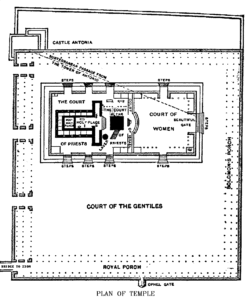
God fearers (Acts 10.2; 13.16, 26) is a term used to describe Gentiles who attached themselves in varying degrees to Judaism without becoming total converts.
For example consider Acts 13.16, 26. When Paul describes his audience as, ‘Men of Israel’ and ‘Family of Abraham’ he is referring to the Jews. Full members of the covenant. Those he describes as, ‘You who fear God’ represent a group of gentiles who shared religious ideas with Jews, to one degree or another. However, they were not converts, but a separate gentile community, engaged in Judaic religious ideas and practices.
The Galatians were god fearers, following the law of Moses as instructed by Jewish leaders of some sort who claimed God’s authority. Their submission to these Jewish leaders, Paul equates with slavery and paganism.
As we see in the above passage they were already observing the Sabbath and various Mosaic calendar festivals (Gal 4.10), but they were not circumcised (Gal 6.12). This makes sense of Paul’s statements in Galatians to the effect they were under the law of Moses.
Actual conversion to Judaism would require circumcision and adherence to all of the Laws of Moses, which includes various prohibitions (kashrut, Sabbath observance etc.). These were generally unattractive to would-be gentile (largely Greek) converts.
Following Luther many reformed interpreters (incl. Schreiner) wrongly assume all people are under the law and its curse because they fail to recognise the identity of the Galatians prior to meeting Paul.
But this all changed for the Galatians when they met Paul.
‘Have come to know God’. Paul says they have come to be known by God and know God. This happened when they heard and believed the gospel.

12 Brothers, I entreat you, become as I am, for I also have become as you are. You did me no wrong. 13 You know it was because of a bodily ailment that I preached the gospel to you at first, 14 and though my condition was a trial to you, you did not scorn or despise me, but received me as an angel of God, as Christ Jesus. (Gal 4.12-14; cf. Gal 3.1-5)
‘Bodily ailment’, ‘Gospel’. Its probable Paul on his way to another location became sick and was forced to rest in Galatia. Even when sick he visited the Jewish synagogue, where he met these Galatian god fearers and shared the gospel with them, they in turn took care of him.
‘Again’ [revisited]. In addition to becoming believers in the gospel, we may assume Paul encouraged the Gentiles in Galatia to stop observing the Mosaic calendar rules. (This will have important repercussions for Paul’s later ministry as we see in Acts 21.) Which is the complementary reason why Paul uses ‘again’ and ‘once more’ to refer to their observance of the Mosaic calendar observances – they stopped (Paul’s instruction) for a period and some time later started observing them again.
When Paul first met the Galatians he found them already interested in Judaism and observing some of the commands in the law of Moses. So now I seek to answer the question, ‘Why did anyone observe the law of Moses?’ That is what is required of those in the Mosaic covenant.

Keeping the Law of Moses
It is not uncommon in the Old Testament to see a group of people called ‘the righteous’ (e.g. Ps 1.1-6). I assume the Jews believed entry into the covenant was either by birth and or circumcision. Perhaps there were washings and sacrifices.
Further, according to the story of Israel, God commanded Israel to keep the law of Moses. ‘The righteous’ are those who kept the law of Moses (e.g. Dt 26.16-17).
The scriptures affirm some people kept God’s commands (e.g. Josh 22.1-3; Lk 1.5-6; Rom 2.26-29; Rev 14.12). Of course when the scriptures affirm that some people have kept the law of Moses, it doesn’t mean they are sinless and have obeyed perfectly. Both covenants have a means of atonement and forgiveness for sin which shows neither were intended to be kept perfectly (e.g. Lev 4.1-2,31; 1 Jn 2.1-2; Rev 12.17; 14.12). In all this we can infer keeping God’s commands involves a regular, yet imperfect practice of all God’s commands in the given covenant.
Maintenance of relationship by obedience and repentance
God promised his people (‘the righteous’) would be blessed and be part of the kingdom to come. Being righteous had covenantal significance (cf. Heb 11; 1 Cor 6.9). What was required was that they remain in the covenant and not break it by transgression.
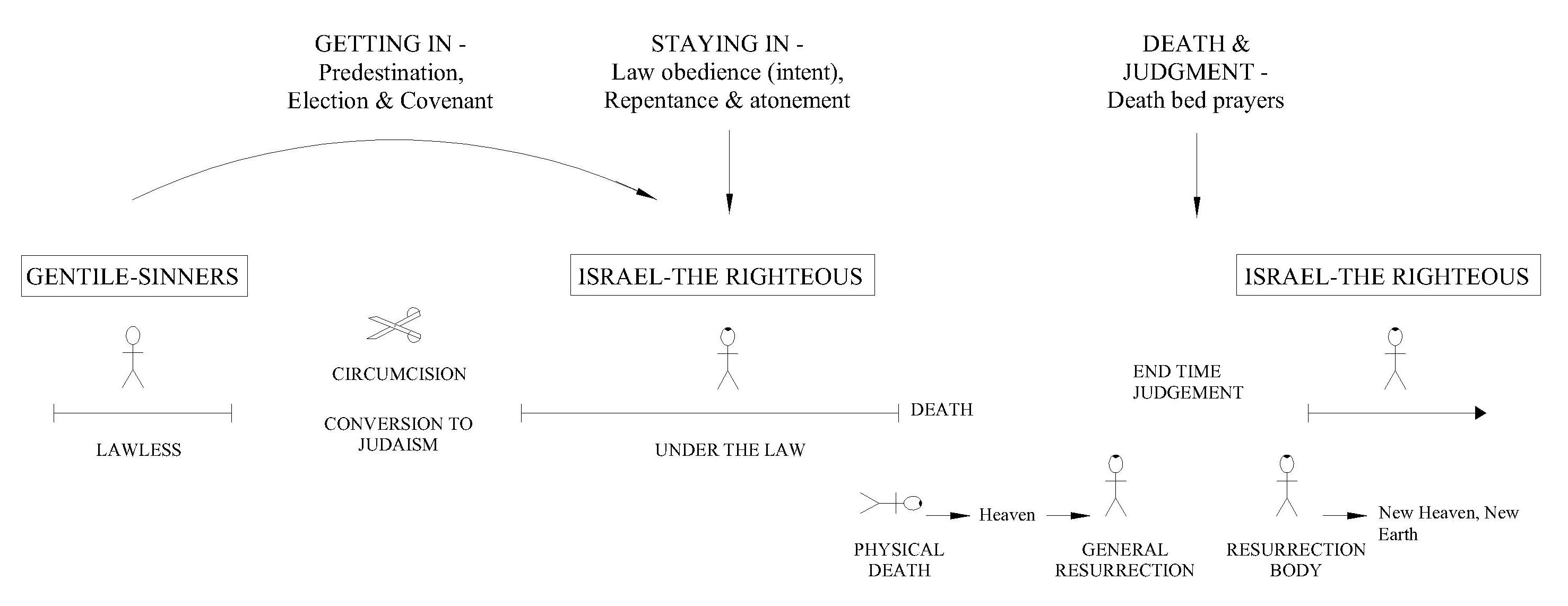
Obeying God by keeping his law was not about getting in by being good enough to earn a right relationship with God. Rather it was about recognising they were in covenant relationship with God and staying in by maintaining that relationship and keeping God’s commands.
This is exactly what the Galatians were doing by observing the ‘works of law’. They weren’t trying to ‘get in’. That is clearly associated with circumcision. The ‘works of law’ are more about ‘staying in’ the covenant relationship, however understood by god fearers, by observing God’s commands in the law of Moses.

Many Jews of the second temple Judaism were aware of their sin and often humbled themselves before God asking forgiveness. We see this in records of their deathbed prayers and in particular the sacrifices they offered for sin and atonement (see my review of Sanders, Paul and Palestinian Judaism).
According to many Jews, neglecting to observe God’s commands in the law of Moses was omissional sin, flagrant disobedience (e.g. Jas 4.17). Something that would incur judgment and condemnation (Ecc 12.13-14; Isa 5.24). Based on these scriptures it’s easy to see why the Gentile god fearers thought they ought to observe them.
Paul’s First Visit and Gospel

What does the scripture say about the gospel?
We know that Paul preached the gospel to the Galatians, but he doesn’t clearly define his understanding of the gospel in this letter as well as he does in other texts. There is a danger I fear many interpreters will let the content of Galatians (particularly justification by faith) become Paul’s gospel. This is exactly the mistake Luther (c.e. 1483-1546) makes in his Galatians commentary;
Now the true Gospel has it that we are justified by faith alone, without the deeds of the Law. The false gospel has it that we are justified by faith, but not without the deeds of the Law. The false apostles preached a conditional gospel. (p29, Luther, Trans. Theodore, A Commentary on St. Paul’s Epistle to the Galatians)
A critical question to ask when reading Galatians then is: ‘What is Paul’s gospel?’ I’ve discussed Paul’s understanding of the gospel in more detail in other posts (page, series, history).
According to Paul, the gospel is the story (historical narrative) of Jesus’ life, death, burial, resurrection, appearances, ascension and coming judgment which declares him the risen Christ (seeks allegiance to him as King). With the implication that those who put their trust in Jesus and give him allegiance as king will be saved.
Set within the wider narrative of creation and Israel, the gospel fulfills God’s promises and prophecies in the Old Testament scriptures (according to scripture) and brings about salvation for all who believe and give their allegiance to Jesus as king (1 Cor 15.3-5; Rom 1.1-5, 16-17; 2.16; 10.9-10; 2 Tim 2.8; Jn 20.31; Acts 13.26-33).

Regarding justification and righteousness, the gospel says people will be justified by their words (Mt 12.37) and does assign a role of obedience (Mt 7.21) and works of mercy (Mt 25.31-46) for future salvation.
Of importance to our reading of Galatians note also Paul’s gospel message in many instances does not refer to ‘justification by faith apart from works of law’. While as we will see in Galatians this is an implication of the gospel, it is not a necessary part of the gospel message.
For some examples of Peter and Paul’s gospel message see below:
| Paul’s Gospel 1 Cor 15.3-5 | Paul’s Gospel Acts 13.26-33 | Peter’s Gospel (Acts 10.34-43) |
| 15 Now I would remind you, brothers, of the gospel I preached to you, which you received, in which you stand, 2 and by which you are being saved, if you hold fast to the word I preached to you—unless you believed in vain. 3 For I delivered to you as of first importance what I also received: | 26 “Brothers, sons of the family of Abraham, and those among you who fear God, to us has been sent the message of this salvation. | 36 As for the word that he sent to Israel, preaching good news of peace through Jesus Christ (lhe is Lord of all), 37 you yourselves know what happened throughout all Judea, beginning from Galilee after the baptism that John proclaimed: 38 how God anointed Jesus of Nazareth with the Holy Spirit and with power. He went about doing good and healing all who were oppressed by the devil, for God was with him. |
| that Christ died for our sins in accordance with the Scriptures, | 27 For those who live in Jerusalem and their rulers, because they did not recognize him nor understand the utterances of the prophets, which are read every Sabbath, fulfilled them by condemning him. 28 And though they found in him no guilt worthy of death, they asked Pilate to have him executed. 29 And when they had carried out all that was written of him, | 39 And we are witnesses of all that he did both in the country of the Jews and in Jerusalem. They put him to death by hanging him on a tree, |
| 4 that he was buried, | they took him down from the tree and laid him in a tomb. | |
| that he was raised on the third day in accordance with the Scriptures, | 30 But God raised him from the dead, | 40 but God raised him on the third day |
| 5 and that he appeared to Cephas, then to the twelve. | 31 and for many days he appeared to those who had come up with him from Galilee to Jerusalem, who are now his witnesses to the people. | and made him to appear, 41 not to all the people but to us who had been chosen by God as witnesses, who ate and drank with him after he rose from the dead. |
| 32 And we bring you the good news that what God promised to the fathers, 33 this he has fulfilled to us their children by raising Jesus, | 42 And he commanded us to preach to the people and to testify that he is the one appointed by God to be judge of the living and the dead. 43 To him all the prophets bear witness that everyone who believes in him receives forgiveness of sins through his name.” |
Note: (1) None of these explicitly refer to justification by faith apart from works of law. They all however describe elements in the story of Jesus. (2) For Paul the gospel has direct application to the inclusion of the Gentiles into God’s covenant (Cf. Eph 3.1-6).
From Gal 4.12-14 and Gal 3.1-5 we can assume through the work of the Spirit, the Galatians believed the gospel Paul preached and received all the benefits of believing the gospel. That is indwelling of the Holy Spirit, union in Christ, membership in the people of God, forgiveness of sins and importantly right standing with God.
Nothing they could have done prior to hearing the gospel would have secured God’s approval or right relationship with him. This includes works of righteousness (cf. Tit 3.5).
According to my diagram below I therefore locate the Galatians at the C3 righteous location because I assume the Galatians have believed the gospel.

Paul’s instructions to new Gentile converts
In the gospel, Jesus commands his apostles to go and make disciples and teach them to observe all he has commanded them (Mt 28.18-20). Gospel proclamation therefore involves commanding new believers in the faith to observe Jesus’ commands.
A quick look at some of the more significant commands Jesus issued include prohibitions against anger, lust, divorce and oaths (Mt 5.21f) and sexual immorality (Mk 7.20-23) and instructions to love God and our neighbour (Lk 10.25-28) and to help the poor and needy (Mt 25.31-46).
I assume after Paul’s gospel proclamation he encouraged his new converts to do good works and observe the prohibitions reflected in the gospel. We can see from several of Paul’s statements he instructed his new converts in the way they ought to live (Tit 3.4-8; Gal 5.19-21; Eph 4.17-24).
Paul doesn’t draw up a list of good things to do. He leaves it up to their own understanding of how to love others under the guidance of the Spirit (Gal 5.5, 16-18; Rom 12.1-2). Galatians has something to say about this.
One reason why Paul encourages his audiences to do good works is because he knows God approves of them and they bring him pleasure (2 Cor 5.9-10; Phil 4.18; 1 Tim 2.1-3). From these and other passages we can safely assume good works (including gift giving and prayer) have God’s approval and please him.
We can see from some of Paul’s statements, another reason why he instructed new believers in doing good works and avoiding the sins of the flesh is because he knew the final judgment would be according to works (Gal 6.7-10; Rom 2.6-11; 2 Cor 5.9-10).
(For others passages on good works and future judgment see also 1 Cor 4.1-5; 2 Cor 5.9-10 or my page on Future Judgment and Salvation)
Lastly, it makes sense based on Paul’s instructions and his understanding of the future judgment according to works that he himself will be pleased when he sees believers doing good (1 Thes 1.2-10; I assume what Paul describes as their ‘work of faith’ and ‘labour of love’ comes under the banner of Paul’s understanding of good works.)
When Paul refers to ‘works’ in his writings a good proportion of times he is speaking about gospel ministry. Note that Paul commends the Philippians for their partnership in the gospel (Phil 1.3-6).
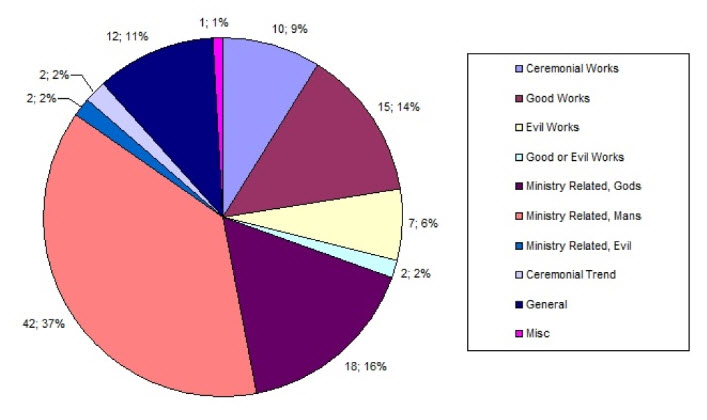
So in all this we see that Paul is quite favourable towards good works. Seeing in them the right response to the gospel and a very positive indication God will complete his work in them. Paul even encourages his audiences to imitate good examples (1 Cor 4.16; Eph 5.1; Phil 3.17; 2 Thes 3.7, 9).
Overall, Paul instructs Gentile believers to perform good works, he says the future judgment will be according to works (therefore based in part on good works) and he commends Gentile believers if he knows they are doing them.
But his response is quite different with respect to the works of the law of Moses.
Judaiser’s Visit
Some time after Paul left Galatia, Jewish Christians, hereafter called ‘Judaisers’, came to the Galatian church and encouraged them to observe the Mosaic calendar observances, this time also encouraging them to be circumcised.
What we know about this group is little.
It is probable they considered themselves to be Christians. They desired to correct the gospel that Paul proclaimed to the Galatians (Gal 1:6–9; 3:3) with ‘another gospel’. We could liken them to others in competition with Paul (cf. Phil 1.15-18).
They themselves wanted to avoid persecution for the cross (Gal 6:12), probably from the unbelieving Jews. Which might explain why they were recently circumcised (Gal 6.13).
They wanted to win the Galatians over to their way of Judaism (Gal 4.17; 5.7-10). So they appealed to the Galatians to be circumcised too, even though they themselves did not keep the whole law of Moses (Gal 6.12-13).
Paul’s response to believers observing works of law
What is apparent from the letter of Galatians is that when Paul heard the Gentiles were again observing various festivals and sabbaths and were considering circumcision he thought something was horribly wrong.
In stark contrast to Paul’s views regarding good works, in Galatians it is very clear Paul does not want the Gentile Christians to think they ought to observe what he calls the ‘works of law’, come under the law of Moses or become Jews.
His initial response is to say by observing these commands they are deserting the gospel.
6 I am astonished that you are so quickly deserting him who called you in the grace of Christ and are turning to a different gospel— 7 not that there is another one, but there are some who trouble you and want to distort the gospel of Christ. 8 But even if we or an angel from heaven should preach to you a gospel contrary to the one we preached to you, let him be accursed. 9 As we have said before, so now I say again: If anyone is preaching to you a gospel contrary to the one you received, let him be accursed. (Gal 1.6-9)
I’ll explain this passage in further detail later in the series in this post.
Then he describes a heated rebuke He gave the apostle Peter in Antioch where the same problem came up earlier. The context involved table fellowship between Jewish and Gentile believers.
11 But when Cephas came to Antioch, I opposed him to his face, because he stood condemned. 12 For before certain men came from James, he was eating with the Gentiles; but when they came he drew back and separated himself, fearing the circumcision party. 13 And the rest of the Jews acted hypocritically along with him, so that even Barnabas was led astray by their hypocrisy.
14 But when I saw that their conduct was not in step with the truth of the gospel, I said to Cephas before them all,
“If you, though a Jew, live like a Gentile and not like a Jew, how can you force the Gentiles to live like Jews? 15 We ourselves are Jews by birth and not Gentile sinners; 16 yet we know that a person is not justified by works of the law but through faith in Jesus Christ, so we also have believed in Christ Jesus, in order to be justified by faith in Christ and not by works of the law, because by works of the law no one will be justified. 17 But if, in our endeavor to be justified in Christ, we too were found to be sinners, is Christ then a servant of sin? Certainly not! 18 For if I rebuild what I tore down, I prove myself to be a transgressor.” (Gal 2.11-16)
I’ll explain this passage in further detail later in the series in this post.
Again we see here Paul refers to the gospel. He also brings in the important topic of justification.
He then refers to their original reception of the gospel and compares it to their former observance of the works of law.
3 O foolish Galatians! Who has bewitched you? It was before your eyes that Jesus Christ was publicly portrayed as crucified. 2 Let me ask you only this: Did you receive the Spirit by works of the law or by hearing with faith? 3 Are you so foolish? Having begun by the Spirit, are you now being perfected by the flesh? 4 Did you suffer so many things in vain—if indeed it was in vain? 5 Does he who supplies the Spirit to you and works miracles among you do so by works of the law, or by hearing with faith— 6 just as Abraham “believed God, and it was counted to him as righteousness”? (Gal 3.1-6)
I’ll explain this passage in further detail later in the series in this post.
Paul asks a series of rhetorical questions to remind them of their conversion, former endurance in the gospel and the giving of the Spirit through which they saw and experienced miracles.
In this last passage Paul says if they continue to rely on the works of law they will be under the Mosiac curse for those who do not observe the whole law. This is because the works of law are only part of the whole law.
10 For all who rely on works of the law are under a curse; for it is written, “Cursed be everyone who does not abide by all things written in the Book of the Law, and do them.” 11 Now it is evident that no one is justified before God by the law, for “The righteous shall live by faith.” 12 But the law is not of faith, rather “The one who does them shall live by them.” 13 Christ redeemed us from the curse of the law by becoming a curse for us—for it is written, “Cursed is everyone who is hanged on a tree”— 14 so that in Christ Jesus the blessing of Abraham might come to the Gentiles, so that we might receive the promised Spirit through faith. (Gal 3.10-14)
I’ll explain this passage in further detail later in the series in this post.
So from these we see Paul responds quite differently when he sees Gentiles doing good works and when they observe the works of the law of Moses.
Why is Paul against Gentiles observing the Law of Moses?
It’s not immediately apparent how observance of the law of Moses is so contrary to the gospel in Paul’s thought. Or why if the Gentiles think these are necessary, how it poses a threat to their salvation. (Note: Paul thinks the Gentiles in Galatia are in danger of apostasy and losing their salvation. Gal 5.4)
So I will flesh out my understanding of why Paul says the Gentile believers are turning to another gospel by observing God’s commands in the law of Moses.
Law as the Story of Israel
We start by asking, ‘What is Paul’s understanding of the law’. The reformers misunderstood what Paul meant by the ‘law’, typically they universalised it and interpreted Paul as if everyone was under it.
“The Reformers, as most [protestant] theologians today, use ’law’ to mean anything that demands something of us… What is crucial to recognize is that this is not the way in which Paul usually uses the term nomos” (Douglas J. Moo, “’Law,’ ‘Works of the Law,’ and Legalism in Paul,” Westminster Theological Journal 45, no. 1 (Spring 1983) : 88.)

I’ve written a series on the law which includes Paul’s understanding of it here. The law comprises of story and command interwoven together. Paul refers to the law as a wider narrative in his writings including Galatians (Rom 3.10-19; Gal 4:21-22; 1 Cor 14.21; cf. Gen 16.5; 21.2; Isa 28.11-12).
Tertullian (c.e. 155-240) gives us helpful insight as to how we can view the law and the gospel.
 “The epistle which we also allow to be the most decisive against Judaism, is that wherein the apostle instructs the Galatians.
“The epistle which we also allow to be the most decisive against Judaism, is that wherein the apostle instructs the Galatians.
For the abolition of the ancient law we fully admit, and hold that it actually proceeds from the dispensation of the Creator,—a point which we have already often treated in the course of our discussion, when we showed that the innovation was foretold by the prophets of our God.
Now, if the Creator indeed promised that “the ancient things should pass away” (Isa 43.18-19; 65.17; 2 Cor 5.17), to be superseded by a new course of things which should arise,
whilst Christ marks the period of the separation when He says, “The law and the prophets were until John” (Lk 16.16)—thus making [John] the Baptist the limit between the two dispensations of the old things then terminating—and the new things then beginning, the apostle cannot of course do otherwise, (coming as he does) in Christ, who was revealed after John, than invalidate “the old things” and confirm “the new,” and yet promote thereby the faith of no other god than the Creator, at whose instance it was foretold that the ancient things should pass away.
Therefore both the abrogation of the law and the establishment of the gospel help my argument even in this epistle, wherein they both have reference to the fond assumption of the Galatians, which led them to suppose that faith in Christ (the Creator’s Christ, of course) was obligatory, but without annulling the law, because it still appeared to them a thing incredible that the law should be set aside by its own author.” (Tertullian, Against Marcion 5.2)
For the early church, the law and the gospel are historical narratives.
 Barclay highlights however the Christ is the interpretative key for all the stories in scripture;
Barclay highlights however the Christ is the interpretative key for all the stories in scripture;
Christ is the hermeneutical key to both Scripture and history, because all of reality takes its bearings from the unique and particular event of his death and resurrection. It is the good news of an event that Paul hears resonating backwards and forwards in history, and backwards and forwards in the text. To invert a well-known phrase, Paul finds echoes of the gospel in the Scriptures of Israel. (p416, Barclay, Paul and the Gift)
God’s commands in the Law of Moses
Paul refers to something called the ‘works of law’ in Galatians several times (Gal 2.16; 3.2,5,10).
To properly understand what the ‘works of the law’ are, I believe it’s necessary to know the various kinds of commands in the law of Moses. If we were to codify the commands in the law we could could categorise them thus:
- Love God and Neighbour
- Honour Parents
These two seem to refer more to attitudes that potentially lead to various actions rather than actions themselves.
- Circumcision
- Festivals and holidays
- Worship and Sacrifice
- Purity and Washings
Other than circumcision, these commands involved regular works and deeds throughout the entire calendar year. Circumcision and Sabbath observance also functioned as signs.
- Idolatry and Foreign Worship
- Sorcery and Divination
- Murder and Violence
- Sexual Immorality
- Stealing
- False Witness and Dishonesty
- Coveting
- Food laws
These commands are all prohibitions against some sort of behaviour. They were behaviours people should not do. Not works or deeds in themselves.
- Firstborn
- Property, Land and Servants
- Punishment and Restitution
- Social Justice and the Poor
- Vows
- Trumpets
- Clothing
- War practices
This last groupings of commands did not involve regular practice for most of the people. They seemed to be irregular. Only on certain events were they required.
The Israelites (including Paul) on the whole thought of the law of Moses as a unity. When they referred to the commands in the law, their use of ‘law’ reflects the whole law. But on occasion they did speak of specific sections in the law of Moses, not the whole. For example;
- The Decalogue,
- when they refer to ‘unclean’ (Cleanliness and Purification laws)
- Acts uses the word ‘customs’ (6.14; 21.21; 26.3; 28.17)
- when the refer to ‘sacrifices’ and ‘offerings’ (temple laws)
- ‘sexual immorality’ (forbidden sex acts in the law)
- ‘days, months, seasons years’ Gal 4.10 (Jewish calendar observances), ‘a festival’ Col 2.16 (Jewish holidays and festivals)
- ‘Food or drink’ (Col 2.16) ‘Never eaten anything unclean’ Acts 10.14 food laws
- works of law, ‘works’ are observable actions, not what I’ve described as the attitudes or prohibitions.
Works of Law
I’ve explained what the works of law are in my New Perspective page here. Very simply the ‘works of law’ are the commands in the law of Moses which require observable actions, works and deeds. Hence ‘works of law’. The most prominent ‘works of law’ are circumcision, the calendar festivals and holidays, temple worship and sacrifice, purity and washings.

I think some of these works were possibly done to provide entry into the covenant (e.g. circumcision, washings and sacrifice), but for the most part were what was required to maintain one’s (righteous) status within the covenant (‘staying in’).
These were observed by Jews as fully fledged members of the covenant and uncircumcised ‘god fearers’ like the Galatians (before the met Paul) as their means of maintaining their relationship with God.
The works of the law however do not constitute the whole law of Moses, although they are clearly related. Paul says;
10 For all who rely on works of the law are under a curse; for it is written, “Cursed be everyone who does not abide by all things written in the Book of the Law, and do them.” (Gal 3.10; cf. Dt 27.26)
He says this because the works of law are not the entire law and those who commit themselves to live under the law, but do not observe the whole law (Gal 5.3) are under a curse.
On further consideration regarding the Mosaic calendar observances we should also note they serve to remind the observers of God’s saving works in the story of Israel (the exodus from Egypt, entry into the promised land, etc).
In the gospel, Jesus undermines most of the works of law, albeit indirectly (e.g. Mk 7.18-19 Clean/unclean laws; 12.1-14 Sabbath; 12.33 Sacrifices and offerings). If Gentile believers assumed they must observe these commands they are undermining the gospel and rejecting what Jesus says about these commands in it.
The Reformed Misunderstanding of Justification and Works of law
The Catholic church and the reformers however misunderstood what Paul meant by ‘justified apart from works of law’ (e.g. Gal 2.15-16; Rom 3.27-30). Calvin (c.e. 1509-1564) says in his commentary on Galatians;

The first thing to be noticed is, that we must seek justification by the faith of Christ, because we cannot be justified by works. Now, the question is, what is meant by the works of the law?
The Papists, misled by Origen and Jerome, are of opinion, and lay it down as certain, that the dispute relates to shadows; and accordingly assert, that by “the works of the law” are meant ceremonies. As if Paul were not reasoning about the free justification which is bestowed on us by Christ. For they see no absurdity in maintaining that “no man is justified by the works of the law,” and yet that, by the merit of works, we are accounted righteous in the sight of God. In short, they hold that no mention is here made of the works of the moral law.
But the context clearly proves that the moral law is also comprehended in these words; for almost everything which Paul afterwards advances belongs more properly to the moral than to the ceremonial law; and he is continually employed in contrasting the righteousness of the law with the free acceptance which God is pleased to bestow. (Calvin, J. & Pringle, W., 2010. Commentaries on the Epistles of Paul to the Galatians and Ephesians, Bellingham, WA: Logos Bible Software.)
Ive argued in my new perspective page and in my series on justification, that throughout the scriptures there is a distinction between the righteous and the sinner. Within this biblical understanding justification can refer to an event when;
- A sinner becomes righteous by some sort of means
- The righteous can be identified as righteous by some sort of means.
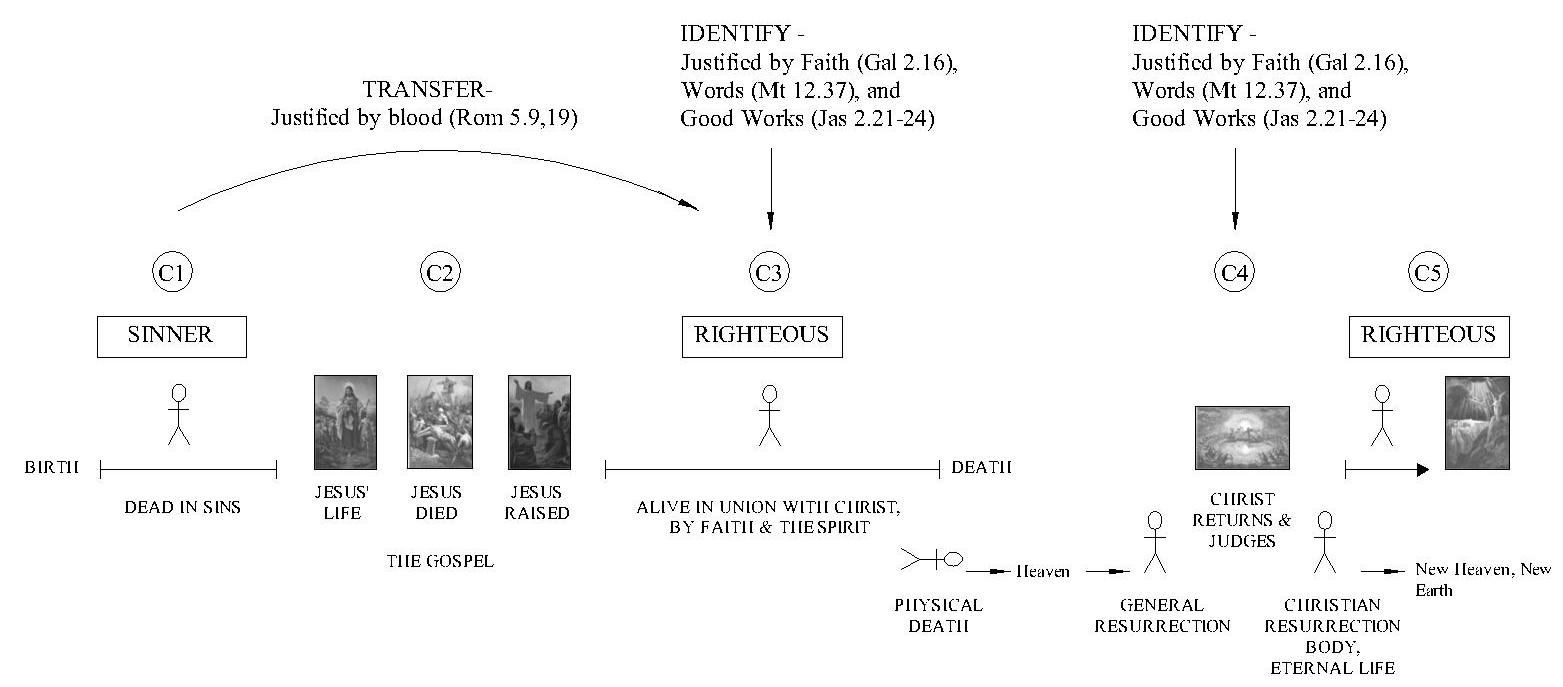
I’ve also demonstrated in my series on early church’s understanding of justification, Gentile believers in those first few centuries were criticised by the Jews why they did not observe the law of Moses. To which the Gentile Christians responded that they appear righteous before God, not through the various works in the law of Moses, but through their faith, just as Abraham was. For example Justin Martyr (c.e. 103-165) argued against Trypho the Jew;

“God demanded by other leaders, and by the giving of the law after the lapse of so many generations, that those who lived between the times of Abraham and of Moses be JUSTIFIED by circumcision, and that those who lived after Moses be JUSTIFIED by circumcision and the other ordinances – to wit, the Sabbath, and sacrifices, and libations, and offerings;… For you [Jews] are not distinguished in any other way than by the fleshly circumcision, as I remarked previously.
For Abraham was declared by God to be RIGHTEOUS, not on account of circumcision, but on account of faith. For before he was circumcised the following statement was made regarding him:
‘Abraham believed God, and it was accounted unto him for RIGHTEOUSNESS.’ [Gen 15.6]
And we [Gentile Christians], therefore, in the uncircumcision of our flesh, believing God through Christ, and having that circumcision which is of advantage to us who have acquired it – namely, that of the heart – we hope to appear RIGHTEOUS before and well-pleasing to God:” (Justin Martyr. (1885). Dialogue of Justin with Trypho, a Jew. In A. Roberts, J. Donaldson & A. C. Coxe (Eds.), The Ante-Nicene Fathers, Volume I: The Apostolic Fathers with Justin Martyr and Irenaeus (A. Roberts, J. Donaldson & A. C. Coxe, Ed.) Buffalo, NY: Christian Literature Company, 245)
Likewise Origen (c.e. 185-254) in his commentary on Romans 11.6;

One should know that the works that Paul repudiates and frequently criticises are not the works of righteousness that are commanded in the law, but those in which those who keep the law according to the flesh boast;
That is the circumcision of the flesh, the sacrificial rituals, the observance of Sabbaths or new moon festivals.
These, then, and the works of this nature are the ones on the basis of which he says no one can be saved, and concerning which he says in the present passage, ‘not on the basis of works; otherwise, grace would no longer be grace.’ (Rom 11.6)
For if anyone is justified through these, he is not justified gratis. But these works are by no means sought from the one who is justified by grace. (p159, Origen, Commentary on Romans, Trans. Scheck, Thomas, P)
These are not the only ones. There are varied references to this understanding of ‘works of law’ in Tertullian (c.e. 155-240), Ambrosiaster (c.e. 366-384), Pelagius (c.e. 360-418) and Augustine of Hippo (c.e. 354–430). The early church understanding of justified by faith apart from works of law concerned in many instances how the righteous (Jews and Gentiles) are identified.
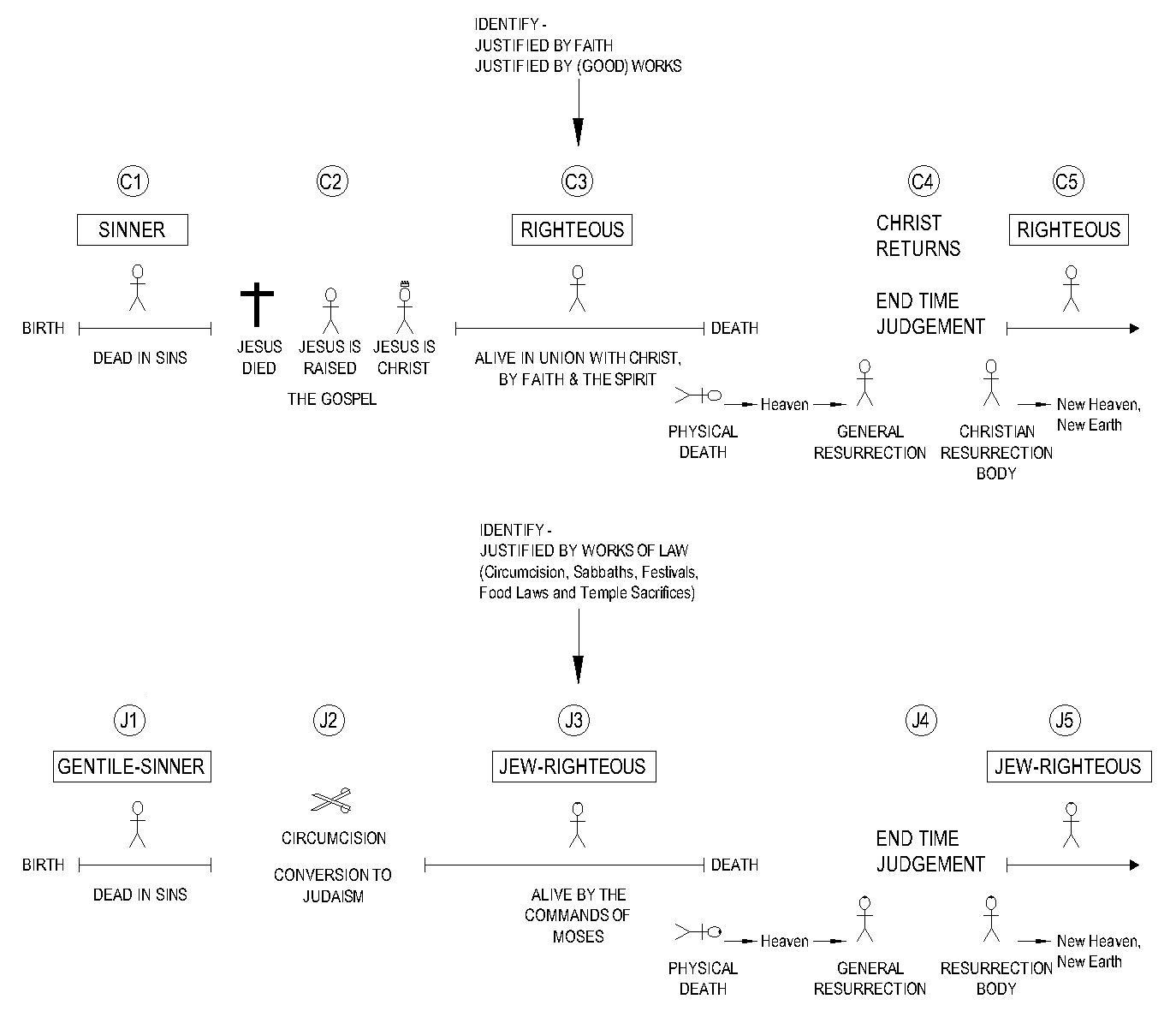
The Papists of Calvin and Luther’s time who referred to the early church correctly understood what the ‘works of law’ were – the ceremonies of the law of Moses – but misunderstood what Paul meant by ‘justified by faith apart from works of law’. They continued to see justification as the means by which a sinner attains righteous standing with God, rather than the way someone who is already in the right before God is to be identified.
As the context of Romans 3-4 also shows, Galatians use of the expression ‘justified by faith apart from works of law’ has in mind a Jew – Gentile situation. Paul for example says;
28 For we hold that one is justified by faith apart from works of the law. 29 Or is God the God of Jews only? Is he not the God of Gentiles also? Yes, of Gentiles also, 30 since God is one—who will justify the circumcised by faith and the uncircumcised through faith. (Rom 3.28-30)
14 But when I saw that their conduct was not in step with the truth of the gospel, I said to Cephas before them all, “If you, though a Jew, live like a Gentile and not like a Jew, how can you force the Gentiles to live like Jews? 15 We ourselves are Jews by birth and not Gentile sinners; 16 yet we know that a person is not justified by works of the law but through faith in Jesus Christ, so we also have believed in Christ Jesus, in order to be justified by faith in Christ and not by works of the law, because by works of the law no one will be justified.” (Gal 2.14-16)
The Jews were expecting Gentile’s who believed in God to adopt God’s commands in the law of Moses. They were looking for the wrong kind of evidence to see if Gentile Christians were righteous.
The reformers misunderstood what Paul meant by ‘justified’ (believing with the Catholics justification is how a sinner becomes-gains-earns-attains-merits a righteous standing in God’s sight. They also misunderstood Paul’s understanding of ‘works of law’ expanding the definition of works of law to every kind of work. Ceremonial, Moral, and even those commanded by Jesus and the Apostles.
The reformed understanding of ‘justified by faith alone’ immediately comes in conflict with Jesus’ (Mt 12.33-37) and James’ (Jas 2.21-24) statements regarding justification and also creates tensions throughout scripture regarding how believers are instructed to maintain their (right) relationship with Jesus (Jn 15.10; 1 Jn 3.7; Jas 5.7-12) and pursue future salvation (Rom 2.6-11; Gal 6.7-10; 2 Pet 1.5-11).

As I’ve argued in my series on explanatory functions, the best theological interpretation of a scripture introduces the least number of tensions with other scriptures and makes sense of the immediate historical context. With this in mind, the reformed interpretation of Galatians, just as the Catholic interpretation, ought to defer to the New Perspective, or should I say the Early Perspective on Paul.
God’s Righteousness, Gospel and the Law
Paul closely associates God’s righteousness with the gospel (Rom 1.16-17) and his gospel ministry (2 Cor 5.18-21). God’s righteousness denotes his saving works and deeds. In part God’s righteousness is his covenant faithfulness in saving his people from slavery and bringing them into his promised inheritance.
Pulling all these together I think we can better understand why Paul is so strongly against Gentile believers thinking they have to observe the law of Moses.

In the Old Testament (Covenant) scriptures God’s righteousness is attested to as part of the Law (Ps 65.5; 71.15-16; 98.1-3). But in the New Testament (Covenant) God reveals his righteousness in the gospel (Rom 1.16-17). That is, the story of Jesus’ life, death, resurrection and coming judgment.
The Law (story of Israel) predicted and witnessed to God’s righteousness in the gospel (Rom 3.21). It served as a ‘protective custodian’ over God’s people Israel (Gal 3.24) and was a shadow of the things to come (Col 2.17). But the gospel which follows the law is apart from it (Rom 3.22).
Paul responds so strongly against Gentiles observing the works of law because he believes;
- Gentile believers who think they have to observe the law of Moses are denying the law has been fulfilled in the gospel.
- Going back to the Law and observing its commands is a denial that in the Gospel, God has acted to save and that Jesus is the promised Christ.
- Observing the works of the old covenant, because they are part of the Law of Moses is a denial of the new covenant God has instituted in Christ and the Spirit.
Structure of the Letter
Introduction
Gal 1.1-5; Introduction; Paul introduces himself, pronounces grace on them and describes Christ’s act of deliverance.
General Problem (Abandoning the gospel)
Gal 1.6-10; Judgment; Paul is astonished that they have turned to a different gospel. People who preach another gospel should be cursed.
Defense of the Apostle and His Gospel – Learning from Jerusalem Gospel check
Gal 1.11-24; History; Paul describes his former life in Judaism and how he was called. Through this he was revealed the gospel so he may preach Jesus among the Gentiles.
Gal 2.1-10; History; Paul checked his gospel against the apostles and they found they were preaching the same thing. They approved his ministry to preach to the Gentiles. He was asked to remember the poor.
Implications of the Gospel & Against the Law of Moses – Learning from Antioch Incident
Gal 2.11-21; Argument; Paul recounts an incident where he opposed Peter because he and others were behaving in a manner that suggested they should live like Jews. Paul continues arguing that the righteous are identified by faith in Christ and not through the Jewish works of law.
Implications of the Gospel & Against the Law of Moses – Learning from their own experience
Gal 3.1-9; Argument; Paul recalls their experience on hearing the gospel and receiving the Spirit comparing it to when they observed the works of law.
Against the Law of Moses – Learning from scripture
Scriptural argument 1
Gal 3.10-14; Argument; Paul gives a series of rapid fire arguments against the Jewish law and point to Christ that confuse most interpreters.
Gal 3.15-29; Argument; Paul explains the salvation history of the Jews and shows it lead up to and was superseded by Christ.
Scriptural argument 2
Gal 4.1-7; Argument; Paul compares the role and obligations of slaves and heirs to communicate they have been redeemed from the law and are now adopted as sons of God.
Gal 4.8-20; Concern; Paul names the works of law he is speaking about. He discusses the circumstances he first preached the gospel to them and laments this current turn of events.
Scriptural argument 3
Gal 4.21-31; Instruction-Argument; Paul gives an Old Testament example from the law concerning Hagar and Sarah.
Gal 5.1-15; Instruction-Argument; Paul instructs them not to submit again to the law, saying that if they get circumcised (ouch), they will have abandoned Christ and become obligated to obey the whole law. Instead he says they should love, which fulfills the whole law.
Old way of the flesh vs New way of the Spirit
Gal 5.16-25; Instruction-Warning; Paul compares the works of the flesh, which he warned them off previously, with the fruits of the Spirit. Those who have the Spirit will evidence these signs, implying they should seek them.
Gal 6.1-10; Instruction; Paul instructs them on how to restore transgressors and encourages them to do good to one another in order to reap eternal life.
Close
Gal 6.11-18; Warning-Close; Paul gives a final warning and finishes the letter.
Copyright © Joshua Washington and thescripturesays, 2017. All Rights Reserved.